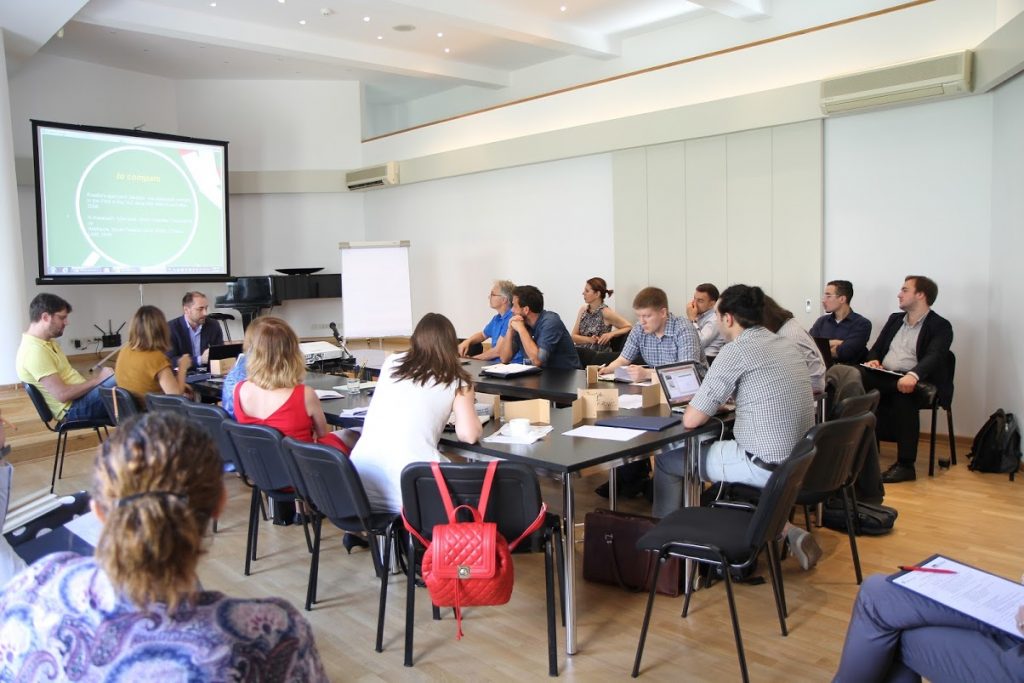
On 7 July, the Center for Governance and Culture in Europe at the University of St Gallen together with the Leibniz Institute for East and South East European Studies Regensburg organized a one-day workshop on the future of secessionist conflicts in the wider Black Sea region. The event was held in Bucharest at the New Europe College and brought together mostly young researchers from Germany, Switzerland, Georgia, Romania, Bosnia-Herzegovina, Czechia, Russia, Azerbaijan and Moldova. In three sessions, participants sought to establish the state of the art in the field of research on secessionist conflicts and – inspired by the University of St Gallen’s research as part of EU-STRAT’s work package 3 – to deliberate on the interdependencies of different secessionist conflicts.
Panel I explored the issue of commonalities and differences between protracted conflicts by focusing on the cases of Abkhazia, South Ossetia, Crimea and Republika Srpska. For one, it touched upon the philosophical question of under which circumstances secession can be justified and whether in the wake of Putin’s justification for annexing Crimea secession may become regularized rather than remain reserved only to extremely oppressed peoples. The argument was made that the Russian foreign policy elite’s approaches to separatist statelets changed not in 2014 but in 2008 following the war in Georgia and Kosovo’s declaration of independence. Moreover, it was emphasized how important not only the ethnic imaginary but also an idealized memory of the Socialist social order was for secessionism and how detrimental intrusive policies by the EU could be – for instance in Bosnia-Herzegovina – for the growth of a culture of democratic accountability.
The second panel concentrated on interdependencies between protracted conflicts in the post-Soviet space and delved into the particularities of relations between Russia and Transnistria as well as the economic cost of conflict in Nagorno-Karabakh. There are some forms of institutionalized exchange between the ‘post-Soviet four’ but the lack of further cooperation is not only due to the preference for other relations (e.g. to Russia) but to different ambitions among local elites and some level of competition over international recognition. Whereas in general the level of the client states’ leeway towards the patron is proportional to the severity of the security threat, for the post-Soviet space the global financial crisis marked a turning point as fiscal dependence on Russian aid reduced agency substantially. The militarization and brinkmanship of the Nagorno-Karabakh conflict meanwhile not only imposes high economic costs on states and communities but also negatively effects education, services, corruption and democracy.
In the third panel on the role of international actors, presentations dealt with the international community’s stabilization dilemma and with the contentious part played by international organizations in shaping dialogue and confidence-building measures in Ukraine and Moldova. As unilaterally seceding entities can subsist even without international recognition, the international community faces the insoluble dilemma that efforts to stabilize the situation on the ground, for example through development work, run counter to efforts to stabilize the international state system. In the case of Ukraine, efforts by the EU and OSCE to foster track 2 and track 3 forms of dialogue in a process of orchestration were hampered by very different understandings among Ukrainian stakeholders of what actually constituted dialogue. Similarly, different agendas among donors and the Moldovan government have created downsides for civilian confidence-building measures regarding relations between Transnistria and the right-bank.
The panels were followed by a collective brainstorming session to develop new avenues for the future of this research field and to sow the seeds for collaborative research projects. One strand of argument arose over the need to provincialize the post-Soviet space and to engage more directly with research on secessionist conflicts in other world regions such as Africa as well as with more theoretical approaches from the field of conflict studies and international relations theory. Overall, the workshop benefitted from a very open and collegial atmosphere and there was a general sense that it would lead to further get-togethers in the near future.
You can find the full workshop programme here:
http://www.nec.ro/data/pdfs/public-events/2018/july/2018-07-07_Workshop.pdf


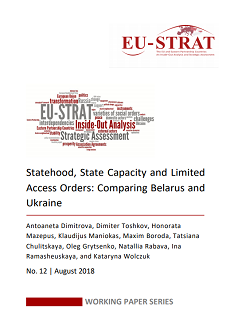 This paper discusses the role of statehood and limited statehood in relation to societal orders in Belarus and Ukraine. We conceptualize state capacity as a crucial factor affecting open and closed access orders and define its key elements. We investigate specifically public service provision by state and non-state actors, while recognizing that security and control over territory are other important aspects of statehood which are problematic in Ukraine. Our empirical investigation of key public services covers, on the one hand, elements affecting public service provision such as public administration reform and independence, and on the other hand, the actual state of basic services. We find that healthcare, postal services and public transport are better developed in Belarus than in Ukraine. This reliable provision of public services likely contributes to the stability of the limited access order in Belarus. At the same time, politicization of the Belarusian public administration and authoritarian centralization of government institutions affect other public services and continue to represent a threat to the economy in Belarus. Ukraine, in contrast, while struggling to deliver some public goods and services, is taking important steps in public administration reform. This could result in creating a more professional and independent public administration in Ukraine and, in the long-term, an opening of access to public services on a more universal basis.
This paper discusses the role of statehood and limited statehood in relation to societal orders in Belarus and Ukraine. We conceptualize state capacity as a crucial factor affecting open and closed access orders and define its key elements. We investigate specifically public service provision by state and non-state actors, while recognizing that security and control over territory are other important aspects of statehood which are problematic in Ukraine. Our empirical investigation of key public services covers, on the one hand, elements affecting public service provision such as public administration reform and independence, and on the other hand, the actual state of basic services. We find that healthcare, postal services and public transport are better developed in Belarus than in Ukraine. This reliable provision of public services likely contributes to the stability of the limited access order in Belarus. At the same time, politicization of the Belarusian public administration and authoritarian centralization of government institutions affect other public services and continue to represent a threat to the economy in Belarus. Ukraine, in contrast, while struggling to deliver some public goods and services, is taking important steps in public administration reform. This could result in creating a more professional and independent public administration in Ukraine and, in the long-term, an opening of access to public services on a more universal basis.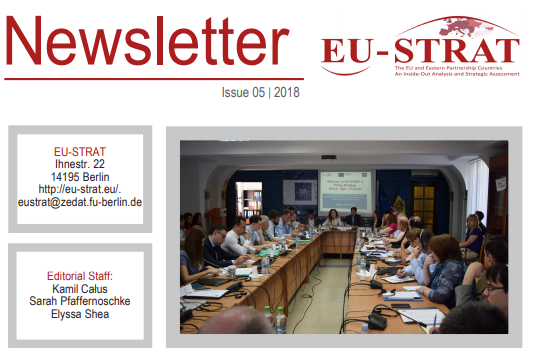
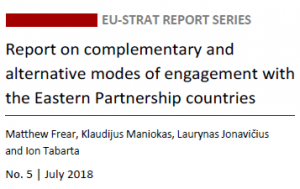
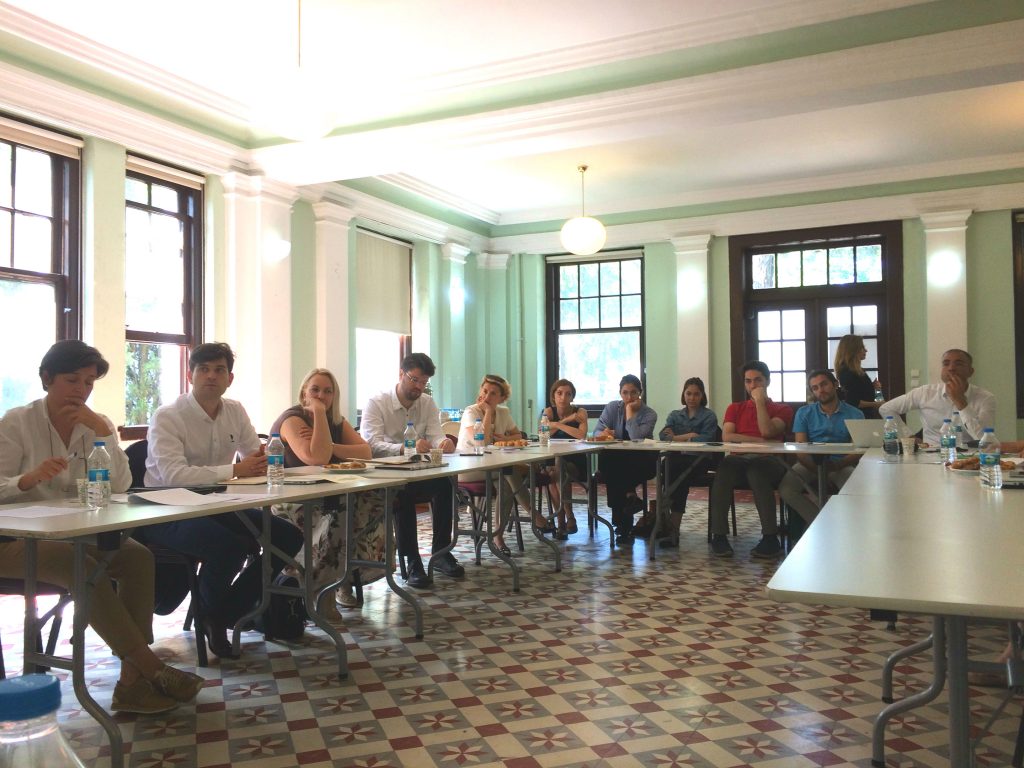
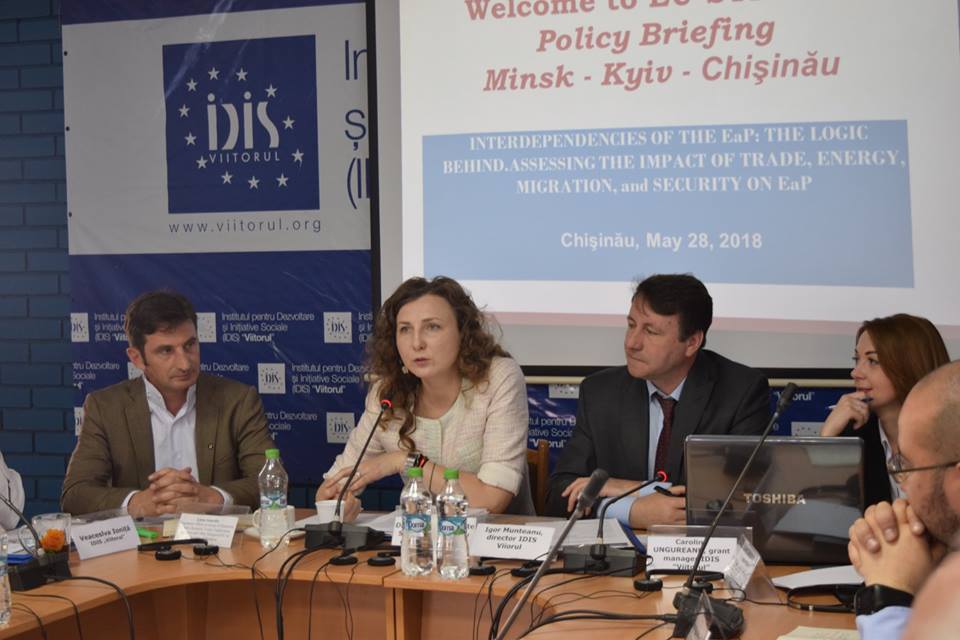

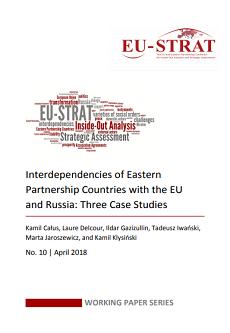 Asymmetric interdependencies with Russia have been identified as a key factor influencing domestic change in response to EU policies in Eastern Partnership (EaP) countries. As argued in the literature, interdependencies can either facilitate or constrain EU-demanded change, depending on whether they are associated with EaP countries’ sensitivity or vulnerability to Russia’s policies. In this paper, we provide a systematic mapping and process-tracing of interdependencies in three EaP countries (Belarus, Moldova and Ukraine) and four key sectors (trade, migration, energy and security). We further explore Russia’s use of interdependencies and attempts at issue-linkage between the above sectors. Finally, we scrutinize domestic elites’ responses to Russia’s strategies.
Asymmetric interdependencies with Russia have been identified as a key factor influencing domestic change in response to EU policies in Eastern Partnership (EaP) countries. As argued in the literature, interdependencies can either facilitate or constrain EU-demanded change, depending on whether they are associated with EaP countries’ sensitivity or vulnerability to Russia’s policies. In this paper, we provide a systematic mapping and process-tracing of interdependencies in three EaP countries (Belarus, Moldova and Ukraine) and four key sectors (trade, migration, energy and security). We further explore Russia’s use of interdependencies and attempts at issue-linkage between the above sectors. Finally, we scrutinize domestic elites’ responses to Russia’s strategies.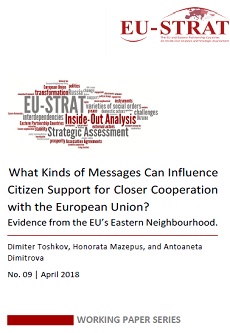 This paper explores what factors might influence citizen preferences for closer cooperation with the EU and/or Russia in three countries from the EU’s Eastern neighbourhood: Belarus, Moldova, and Ukraine. The citizens in these countries have been exposed to competing narratives and policy frames, advanced by both the EU and Russia, about the purposes and effects of closer cooperation. We first develop theoretical ideas about the potential influence of framing on public attitudes towards international cooperation. We then study these ideas empirically using a survey experiment in which six different frames about international cooperation are embedded in short vignettes. The frames highlight themes such as economy, security, values or identity and were developed based on previous research on factors that influence preferences on international cooperation. The experiment was implemented among a diverse and relatively large sample of citizens in the three countries.
This paper explores what factors might influence citizen preferences for closer cooperation with the EU and/or Russia in three countries from the EU’s Eastern neighbourhood: Belarus, Moldova, and Ukraine. The citizens in these countries have been exposed to competing narratives and policy frames, advanced by both the EU and Russia, about the purposes and effects of closer cooperation. We first develop theoretical ideas about the potential influence of framing on public attitudes towards international cooperation. We then study these ideas empirically using a survey experiment in which six different frames about international cooperation are embedded in short vignettes. The frames highlight themes such as economy, security, values or identity and were developed based on previous research on factors that influence preferences on international cooperation. The experiment was implemented among a diverse and relatively large sample of citizens in the three countries.